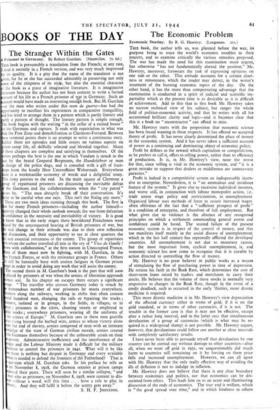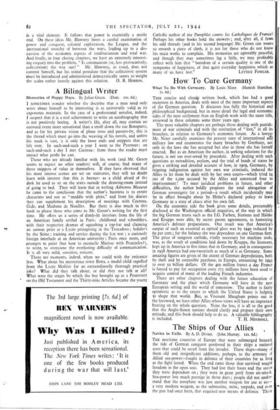Economic Destiny. By R. G. Hawtrey. (Longmans. 21s.)
THIS book, the author tells us, was planned before the war, its purpose being to trace the world's economic troubles to their sources, and to examine critically the various remedies proposed. The war has made the need for this examination more urgent, but otherwise " has not fundamentally altered the position." Mr. Hawtrey, moreover, forswears the task of expressing opinions on one side or the other. This attitude accounts for a certain aloof- ness or remoteness, which the reader may detect, in the writer's treatment of the burning economic topics of the day. On the other hand, it has the more than compensating advantage that the examination is conducted in a spirit of judicial and scientific im- partiality which at the present time is as desirable as it is difficult of achievement. Add to this that in this book Mr. Hawtrey takes no narrow technical view of his subject, but ranges the whole field of politico-economic activity, and that he writes with all his accustomed brilliant clarity and logic—and it becomes clear that this is a book no " reconstructor " can afford to miss.
Mr. Hawtrey starts with the proposition that economic science has been found wanting in three respects. It has offered no accepted theory of profit. It has never clearly determined the place of money in the economic system. And it has never taken a sufficient account of power as a continuing and dominating object of economic policy.
Profit he defines as the reward which capitalism or compeutivism, as he prefers to call it, offers to selling power, rather than to efficiency of production. It is, in Mr. Hawtrey's view, none the worse for that, since selling is vital to the economic system, and " it is a great mistake to suppose that dealers or middlemen are unnecessary parasites."
Profit is indeed in a competitivist system an indispensable incen- tive to enterprise. Nevertheless, it is " an anomalous and invidious feature of the system." It gives rise to excessive individual incomes, and worse still, in .conjunction with labour monopolist action, i.e.; trade union wage policy and restrictionism, to unemployment Organised labour uses methods of force to secure increased wages. often oblivious of the fact that a " sufficient prospect of profit '3 is a condition of enterprise, and therefore of full employment. But what gives rise to violence is the absence of any recognised principles on which a settlement commanding general assent and confidence could be based. The second failure of the present economic system is in respect of the control of money, and this too manifests itself mainly in the social disease of unemployment, which in the last half century has repeatedly afflicted the developed countries. All unemployment is not due to monetary causes, but the most important .form, cyclical unemployment, is, and economic science has now come to recognise that it is curable by action directed to controlling the flow of money.
Mr. Hawtrey is no great believer in public works as a means of stimulating the flow of purchasing power in time of depression. He retains his faith in the Bank Rate, which determines the cost of short-term loans raised by traders and merchants to carry their stocks. He believes that the volume of these stocks is normally very responsive to changes in the Bank Rate, though in the event of a credit deadlock, such as occurred in the early 'thirties, more drastic medicine is required.
This more drastic medicine is in Mr. Hawtrey's view depreciation of the affected currency either in terms of gold, if it is on the gold standard, or in terms of other currencies, if it is not. The trouble in the former case is that it may not be effective, except after a rather long interval, and in the latter case that simultaneous devaluation of a group of currencies (which is what may be re- quired in a widespread slump) is not possible. Mr. Hawtrey argues, however, that devaluations could follow one another at close intervals with completely satisfactory results.
I have never been able to persuade myself that devaluation by one country can be carried out without damage to other countries—after all, when we went off gold in 1931, we unquestionably did much harm to countries still remaining on it by forcing on them price falls and increased unemployment. However, we can all agree with Mr. Hawtrey that the only really effective way of avoiding the ills of deflation is not to indulge in inflation.
Mr. Hawtrey does not believe that there is any clear boundary between economics and politics, nor that economics can be dis- sociated from ethics. This leads him on to an acute and illuminating discussion of the ends of economics. The true end is welfare, which is. " the good spread over time," and in which kindness to others
is a vital element. It follows that power is essentially a sterile end. On these ideas Mr. Hawtrey bases a careful examination of power and conquest, colonial exploitation, the League, and the international anarchy of between the wars, leading up to a dis- cussion of the economic aspects of totalitarianism and total war. And finally, in four closing chapters, we have an extremely interest- ing enquiry into the problem, " Is communism (or, less provocatively, collectivism) the way out? " Mr. Hawtrey, as usual, does not commit himself, but his initial postulate that the collectivist system must be introduced and administered democratically seems to weight
the scales rather heavily against this solution. 0. R. Hoasox.























 Previous page
Previous page